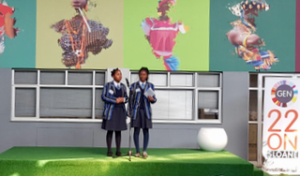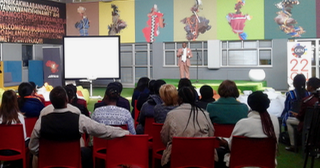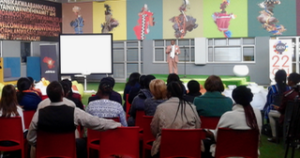The Foundation for the Advancement of Entrepreneurial & Technology Education hosted a conference earlier this week, on 13 and 14 August, at GEN Africa at 22 On Sloane, supported by JASA.
Founder of the organisation, Simon White, spoke about the implementation of entrepreneurial education in a school, based on his direct experience as principal of Chartwell Leadership Primary.
In the five years since Chartwell opened, the school has set a high academic standard while shaping an entrepreneurial culture. Not only is entrepreneurship embedded into the formal school curriculum but children are encouraged to start up businesses and save their profits. By age five, learners already understand the four means of production and some are even testing their first business ideas.
One of Chartwell’s young entrepreneurs is 11-year-old Latoya. After learning to knit at school, she passed on this skill to five fellow learners and together they knitted scarves to sell. The R300 they made has enabled them to grow the business with Latoya now Iearning to sew and do embroidery. Another 11-year-old, David, has diversified from knitting, which earned him R800, to selling Tupperware to family members. Learners at the school are also currently being taught to make cheese and milk. The aim is for students to have saved between R15 000 and R20 000 by the time they leave school to use for studies or kickstarting businesses.
Chartwell is setting a benchmark for entrepreneurial education nationwide and this conference marks the next phase of the foundation, which is to extend the learning to 20 other schools.
White explained that the foundation has done extensive research on introducing entrepreneurship in schools. After analysing what is currently available, the gaps in the curriculum were identified. As one example, time management is usually only taught at university level but it is a critical skill that should be introduced to learners at a far younger age. The ability to cope with studies and other activities successfully depends on being able to prioritise and use one’s time well. The research phase also entailed studying global best practices and consulting relevant stakeholders.
 JASA has been running financial literacy programmes at Chartwell and JASA MD Nelly Mofokeng presented on how the organisation’s entrepreneurial capacity can be leveraged in the creation of this culture of entrepreneurship. Then two JASA school programme alumni, Gugulethu Ngwenyama and Amohelang Molefi from McCauley House, spoke about the business journey of their company to cinch the top prize at JASA’s national Company of the Year Competition.
JASA has been running financial literacy programmes at Chartwell and JASA MD Nelly Mofokeng presented on how the organisation’s entrepreneurial capacity can be leveraged in the creation of this culture of entrepreneurship. Then two JASA school programme alumni, Gugulethu Ngwenyama and Amohelang Molefi from McCauley House, spoke about the business journey of their company to cinch the top prize at JASA’s national Company of the Year Competition.
Hands-on, experiential programmes, such as those offered by JASA, fit well into the evolving learning model with its focus on projects that expose children to abstract problems they are encouraged to solve through discussion and collaboration.
The foundation also emphasises the need for fostering innovation and sharpening STEM2D skills in learners to prepare them to be productive in the emerging world of robotics, artificial intelligence and nano technology. Partnerships will provide related learning opportunities, such as with ZA Central Registry, which will be training 150 learners in coding and website development, and linking with the global organisation, ThinkYoung.
The foundation also aims to attract a target of 50 000 entrepreneurship members as a foundation for creating 10 000 entrepreneurs.







